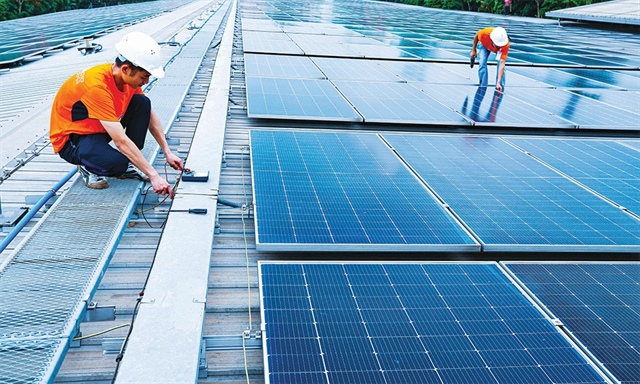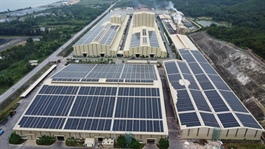Self-sufficient solar policy thrashed out
Self-sufficient solar policy thrashed out
The government is expected to enact a new policy to encourage self-sufficient energy consumption and ease pressure on the national grid.
The Ministry of Industry and Trade (MoIT) is seeking public feedback on a draft decision to support households in installing rooftop solar power systems for self-generation and consumption.

Some experts want the government to enable households to both consume and sell electricity freely, Photo: Le Toan |
According to the draft, eligible households will receive investment subsidies of up to VND500,000 ($20) per kWp of installed photovoltaic capacity, capped at VND2.5 million ($100) per household. In addition, soft loan interest subsidies will be provided for those seeking commercial financing for rooftop solar installation and battery storage systems.
The draft proposes a maximum interest support period of three years, based on short-term lending rates regulated under Circular No.39/2016/TT-NHNN from the State Bank of Vietnam. Households can borrow up to VND7 million ($290) per kWp of PV capacity, with a ceiling of VND35 million ($1,400) in total supported loans.
The support will be allocated from provincial development investment budgets, with local People’s Committees responsible for submitting annual proposals to their respective People’s Councils based on budget availability and local demand for residential solar development.
Besides financial assistance, the draft also mandates technical support during the investment, installation, and operation phases. Upon request, local power companies must provide households with technical guidance such as requirements for connection, control, monitoring, and protection within five working days.
In cases where households wish to sell excess electricity back to the grid, local utilities are responsible for assisting with the installation or replacement of bidirectional meters and guiding homeowners through the procedures for signing power purchase agreements. Moreover, commune-level People’s Committees will advise on construction design, structural safety, and fire prevention measures tailored to the specific housing conditions of each locality.
To qualify for financial support, households must submit a formal request to their local authorities and ensure the system is fully installed, tested, and operational in accordance with Decree No.58/2025/ND-CP issued in March. Those applying for interest subsidies must also meet requirements under Vietnamese credit and lending regulations.
The proposal has drawn mixed reactions from experts and solar developers, who believe the financial package remains modest. Dr. Tran Dinh Ba, senior economic analyst at the Vietnam Economic Science Association, drew attention to the broader macroeconomic implications. “As Vietnam accelerates its transition from fuel-powered to electric vehicles, the demand for electricity will surge. We need to engage households now at scale to install rooftop solar as a low-cost, decentralised solution to address the power challenge.”
He urged the government to go beyond limited subsidies and open the mechanism for household participation more meaningfully. “The proposal is a good start, but the government should go further by enabling households to both consume and sell electricity freely,” Ba added. “Instead of only offering small grants, let families export excess solar during the day and draw power at night, with a net accounting mechanism. That would be much more effective.”
However, Ba cautioned against encouraging widespread household investment in battery storage, citing cost and safety concerns. “Battery storage is expensive and poses safety risks if not regulated properly. Net-metering would remove the need for storage in many cases,” he said.
Nguyen Quoc Viet, director of Vinasol JSC said that, on average, a residential solar system typically ranges 6–10 kWp, requiring total investment of around $4,900-8,100.
“A maximum subsidy of $100 barely makes a dent,” Viet said. “Limiting interest rate support to $290 per kWp is insufficient, especially for households considering battery storage, which still carries high capital costs.”
The MoIT highlights key advantages of self-produced and self-consumed rooftop solar. First, it does not require additional land, and only connects to existing low-voltage distribution grids, thus avoiding the need for new 110kV or higher transmission infrastructure. Secondly, rooftop solar systems reduce household electricity bills by offsetting grid consumption, especially under Vietnam’s tiered residential pricing scheme. Operating and maintenance costs are low, while the average investment cost for rooftop solar has fallen by more than 10 per cent annually in recent years.
Most importantly, these systems align with Vietnam’s commitment to reach net-zero by 2050.
- 11:58 29/07/2025



























